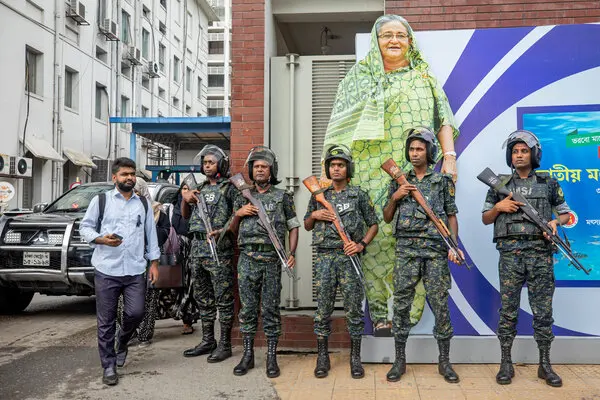Was Sheikh Hasina Ousted in a Coup by Army Chief Waker-Uz-Zaman?

News Mania Desk/Agnibeena Ghosh/7th August 2024
Sheikh Hasina, the Prime Minister of Bangladesh, was compelled to resign and flee the country amidst escalating violence and political turmoil. The catalyst for her sudden departure appears to be a pivotal decision by the Bangladesh army chief, Waker-Uz-Zaman. According to a report by Reuters, Zaman held a crucial meeting instructing his officers not to open fire on civilians who were protesting to enforce a curfew called by Hasina.
An Indian official familiar with the unfolding events noted, “Hasina no longer had the army’s support.” This lack of support became evident when Zaman contacted Hasina’s office, informing her that his soldiers would not enforce the lockdown she had requested. This decision came in the wake of violent clashes that erupted on Sunday, resulting in at least 91 deaths and hundreds of injuries.
The nationwide curfew was imposed in an attempt to quell the unrest that had begun as a student demonstration against preferential quotas in government jobs. This protest, which started in June, gradually escalated, leading to widespread violence and the loss of at least 300 lives. The escalating crisis led to the army chief’s critical decision, which effectively undermined Hasina’s authority and forced her to resign.
Despite the significant impact of his actions, Army Chief Waker-Uz-Zaman has not publicly explained his decision to withdraw support from Hasina. Speculations abound regarding the reasons behind his move. Retired Brigadier General M Sakhawat Hossain suggested that there was considerable unease among the troops. “There was a lot of uneasiness within the troops,” Hossain remarked, “That is what probably put pressure on the chief of army staff because the troops are out and they are seeing what is happening.”
In the midst of this political upheaval, Nobel laureate Muhammad Yunus is set to return to Bangladesh on Thursday, according to an official statement. The protestors are rallying behind Yunus, hoping he will lead the interim government. Yunus, known for his pioneering work in microfinance, is seen as a potential stabilizing figure in the chaotic political landscape.
Sheikh Hasina’s resignation marks a dramatic turn in Bangladesh’s political saga. Her departure on Monday came after the deadly protests demanding her resignation spiraled out of control. The protests highlighted deep-seated frustrations within the populace and revealed significant fractures within the government and its security apparatus.
The roots of the unrest can be traced back to June, when a student-led demonstration against the government’s job quota system began. What started as a peaceful protest quickly turned deadly, with violence escalating over the following months. The government’s inability to effectively address the demonstrators’ grievances and the subsequent heavy-handed response only fueled further unrest.
The situation reached a tipping point when Army Chief Waker-Uz-Zaman decided to withdraw military support for Hasina’s curfew enforcement. This decision not only highlighted the lack of unity within the government but also signaled to the protestors that the military was not willing to take a hardline stance against them. Consequently, Hasina found herself isolated and unable to maintain control, leading to her resignation and departure from the country.
As Bangladesh navigates through this turbulent period, the role of figures like Muhammad Yunus could prove crucial. His return to the country may offer a glimmer of hope for a peaceful resolution and the establishment of an interim government that can steer the nation towards stability. The unfolding events underscore the fragile nature of political power and the profound impact of military decisions in shaping the course of a nation’s history.






